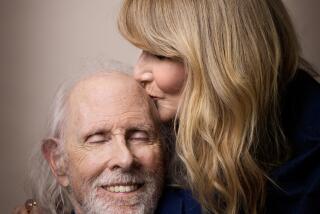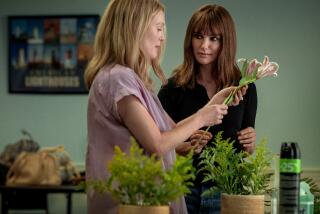TRIBUTE TONIGHT : ACADEMY, CINEMATHEQUE HONOR FREDRIC MARCH
- Share via
SANTA BARBARA — Florence Eldridge, widow of Fredric March, reminisced with affection and enthusiasm from her splendid condominium on the edge of the sea.
“I do hope they show Freddy in a scene from ‘The Iceman Cometh.’ He was so sick that it was his last movie. But, my God, he gave a performance. That movie showed his strength. He was so versatile. To me, that’s what’s important about his career.”
Tonight clips from “Iceman Cometh” and scenes from 17 other March movies will be screened as part of a joint tribute to the late actor by the Academy of Motion Picture Arts and Sciences and the American Cinematheque.
Eldridge will participate in the special program along with several Hollywood luminaries who worked with March. The event, open to the public, starts at 8 p.m. at the Samuel Goldwyn Theater in Beverly Hills.
March, who died in 1975 at the age of 77 after a towering film and stage career that bridged half a century and numbered 69 films, always enjoyed a huge personal advantage. He was exceptionally lucky in marriage.
He married a star on the rise who thought more of March than her career. Eldridge was a better-known and higher-paid actor than March when they married in 1927 while touring with the Theater Guild. In one play they did together, “The Silver Cord,” March (three years Eldridge’s senior) played her son. But when they hit Los Angeles together in 1928 to perform in “The Royal Family” at the El Capitan, it was the dawn of talkies.
March, with his handsome, John Barrymore-like visage and his great voice, was grabbed by Paramount. In a decision historically notable for actor-actress marriages, Eldridge consciously took a back seat. From that moment, her primary goal was to act with March, not dart off on a competitive path.
The result from the ‘30s into the ‘60s was a tremendous partnership--several joint roles in films and plays in the course of a scandal-free, 48-year, and, by all measures, golden marriage. Their most glorious dual achievement probably occurred in 1956 when they co-starred as the embattled Tyrones in the Pulitzer Prize-winning Broadway production of “Long Day’s Journey Into Night.” Their last film together was “Inherit the Wind” (1960).
Eldridge, who just turned 86, sat on a divan with magazine layouts of her storied life with March spread across her silk white dress. Vibrant, articulate, attractive, Eldridge played down her own career to better dramatize March’s. “For the most part I just took secondary roles,” she said, not too accurately.
“Sure, I made sacrifices but it was fun to do and it marked our life. When we got married, I didn’t want to start my marriage making more money than Freddy, so I asked our management at the Elitch Gardens stock company in Denver to combine our two salaries and divide the check in half.”
Once into film, March, she said, “became so dedicated to acting that even after he won an Oscar (for his fiendish role in “Dr. Jekyll and Mr. Hyde”) he would drive up to Santa Barbara three times a week to study with a coach (Margaret Carrington) who had worked with John Barrymore on his “Hamlet.”
March acted with all the top female stars, including Clara Bow (“The Wild Party,” 1929) and Garbo (“Anna Karenina,” 1935). While making the latter, Eldridge recalled, March and Garbo spent a lunch break rowing together on a lake on the MGM lot.
“As Freddy explained it to me, he asked her if she liked children and told her she should have children. Garbo answered, ‘Don’t you think it’s a little bit late for you to be making such a proposition.’ ”
The Marches lived for a number of their Hollywood years in a lavish French provincial house on Ridgedale Drive in Benedict Canyon. (In the ‘50s they moved to a 1780 farm house in New Milford, Conn.) Eldridge says she will never forget the evening when they hosted a fund-raising drive among Hollywood liberals to buy ambulances for the loyalists in Spain. Ernest Hemingway and F. Scott Fitzgerald showed up. So did Mary Pickford, Charlie Chaplin and Donald Ogden Stewart.
On occasion, said Eldridge, March would turn down movies if Eldridge had starred with him in the stage version and the producer wanted to cast another actress for the film. That’s why, for instance, March turned down the film of “Long Day’s Journey Into Night.”
“He felt uncomfortable doing the movie without me,” said Eldridge. The film starred Sir Ralph Richardson and Katharine Hepburn in the roles with which the March couple had bedazzled Broadway.
Subject to last-minute change, the tribute Monday will include clips from “Anna Karenina” and “The Wild Party” (the latter, obtained from the UCLA archives, is still on nitrate but in good condition).
Other scenes, in a screening that should run 80-90 minutes, will reel moments from “The Best Years of Our Lives” (which earned March his second best actor Oscar in 1946), “Susan and God” (co-starring Joan Crawford), “Death of a Salesman,” “Les Miserables,” “A Star Is Born,” “Executive Suite,” “Middle of the Night,” “Nothing Sacred,” and one of Eldridge’s favorites, the controversial “Act of Murder” (alternately entitled “Live Today for Tomorrow,” which deals with euthanasia and was deemed so risky by Universal that it was released in 1948 on the lower half of double bills, Eldridge said).
March’s film and stage associates reported to be joining in the tribute are academy president Robert Wise, silent star Coleen Moore (who, like Eldridge, is 86 and appeared with March in the 1929 “Footlights and Fools”), Teresa Wright, Shelley Winters, John Houseman, Stanley Kramer, Delbert Mann, Martin Ritt and Morton Gottlieb. Norman Corwin will moderate.
Near the the end of his life, March accepted director John Frankenheimer’s entreaty to perform the tough Harry Hope role in the film version of “The Iceman Cometh” for the American Film Theater series.
“They were filming at Fox,” Eldridge began, “and Lee Marvin was playing Hickey. But March couldn’t be insured. The insurers knew he was very ill. So John (Frankenheimer) took Freddy with no insurance. John agreed to personally pay the cost if Freddy’s scenes had to be reshot.
“Production started and then Freddy had a stroke. Finally, they made it to Freddy’s last scene, where Harry Hope makes that big effort to step outside his bar into the real world for the first time in years. It’s a very dramatic scene and Freddy wasn’t going to let John down. He checked himself into a hospital for a weekend to rest up for the Monday shot. That morning he asked me, ‘Will you go out to the studio with me today?’ He had never asked me such a question before.
“I swear he was so ill he hardly knew which end was up. But he was such a technician and actor that he could do any damn thing he wanted to, even if he was sick. He shot the scene . . . and it was great.”
More to Read
Only good movies
Get the Indie Focus newsletter, Mark Olsen's weekly guide to the world of cinema.
You may occasionally receive promotional content from the Los Angeles Times.








